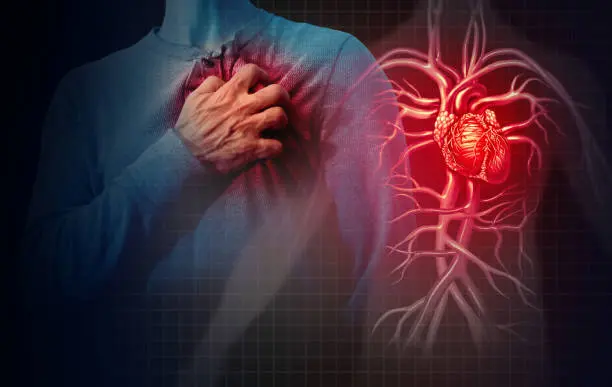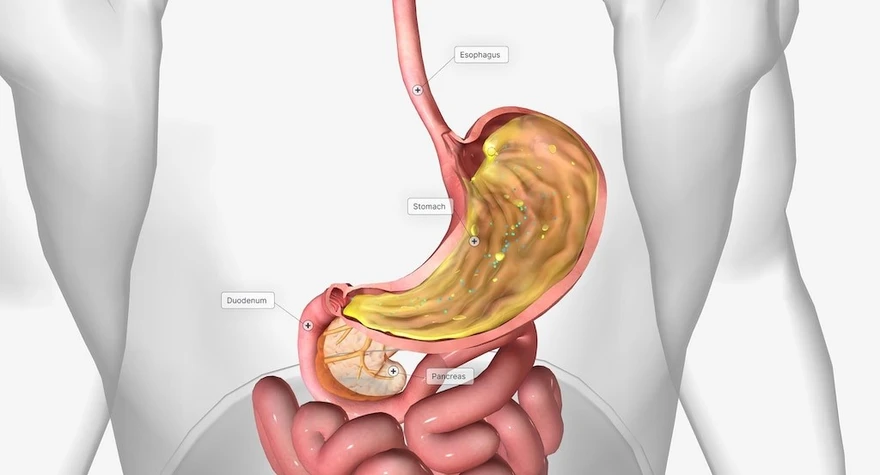Preventive Healthcare
9 Heart Attack Symptoms in Men
27447 Views
0

A heart attack is a life-threatening event that can happen when blood flow to the heart is blocked. Most heart attacks occur when a blood clot forms in one of the arteries that supply blood to the heart.
Heart attack symptoms in men can vary but usually include chest pain, shortness of breath, lightheadedness, and sweating. If you experience any of these symptoms, you must get medical help immediately.
Nine Warning Heart Attack Symptoms in Men
Men are more likely than women to have a heart attack and die from one, so men must be aware of the signs and symptoms.
- Chest Discomfort
- Indigestion, Nausea, Stomach Pain, or Heartburn
- Pain in Your Body Spreading to Your Arms
- Sudden Fatigue
- Snore Too Much
- Sweat for No Apparent Reason
- Cough a Little too Much
- Throat Pain
- Swollen Legs
Chest Discomfort
The most common sign of heart danger is a blocked artery. If you are experiencing pain, tightness, or pressure in your chest, this could indicate that there's been some disruption in airflow through the muscle wall near your lungs. This could result in difficulty breathing and subsequent panic attacks, causing an inability to oxygenate.
Note: Keep your heart healthy by staying on the safe side. You may not be experiencing chest pain, but that doesn't mean you're in tip-top shape!
Indigestion, Nausea, Stomach Pain, or Heartburn
Many people overlook nausea, indigestion, heartburn, or stomach pain as potential signs of a heart attack. However, these can be some of the first indicators of something wrong. While heartburn can often be relieved with antacids, it may indicate your vulnerability to heart attacks if the pain is accompanied by shortness of breath, sweating, or chest pain.
Pain in Your Body Spreading to Your Arms
One of the most common heart attack symptoms is pain radiating from the chest to the arm. This pain is often described as a feeling of tightness, pressure, or squeezing. While it can occur on either side of the body, it is most commonly felt on the left side. While chest pain is often the most noticeable symptom of a heart attack, it is essential to remember that not all heart attacks involve chest pain. Some people may experience no chest pain at all.
Sudden Fatigue
When most people think of a heart attack, they envision someone clutching their chest in pain. While this can indicate a heart attack, it is by no means the only one. Many people experience more subtle symptoms in the weeks and days leading up to a heart attack but fail to recognise them as signs of danger. One such symptom is sudden fatigue. It could be a sign of a heart attack if you feel exhausted for no reason, especially if it is accompanied by shortness of breath or chest pain. Don't ignore these warning signs—get to a hospital immediately.
Snore Too Much
Though often seen as a nuisance, snoring can be a serious medical condition. In some cases, snoring can be a symptom of heart disease. When the heart isn't pumping efficiently, blood can back up in the vessels and cause them to narrow. This narrowing can restrict blood flow and cause blood pressure to rise. Over time, this can lead to a heart attack. If you or someone you know is regularly snoring, you must see a doctor for a check-up.
Sweat for No Apparent Reason
It's normal to sweat when you exercise, are in a hot environment, or are under stress. But if you suddenly develop excessive sweating for no apparent reason, it could indicate a heart attack. This is especially true if the sweating is accompanied by other symptoms such as chest pain, shortness of breath, or dizziness. While several things can cause excessive sweating, it's often one of the first signs of a heart attack. So if you're feeling unusually sweaty for no reason, don't ignore it. Get help right away. It could save your life.
Cough a Little too Much
Although it is often dismissed as a minor symptom, coughing can indicate a heart attack. When the heart is not receiving enough oxygen, it triggers a protective reflex that causes the blood vessels to constrict. This narrowing of the vessels can reduce blood flow to the heart and cause the lung tissue to swell. As a result, people with a heart attack may experience shortness of breath and a persistent cough. In some cases, the cough may produce frothy or bloody mucus. While coughing is often harmless, it can also indicate a serious medical condition. Therefore, it should not be ignored.
Throat Pain
Throat pain is often described as a feeling of tightness, pressure, or squeezing. It may also feel like someone is choking you or that there is a lump in your throat. In some cases, people may also experience jaw pain, neck pain, or back pain. While chest pain is still the most common symptom of a heart attack, it is important to be aware of other potential warning signs so that you can get medical help soon.
Swollen Legs
Swelling in the legs, ankles, and feet is a common side effect of heart failure. When the heart doesn't pump properly, fluid can back up in the veins and cause the legs to swell. The medical term for this condition is peripheral oedema. Although it's not usually painful, it can be uncomfortable and make it difficult to move around. Swelling can also indicate other problems, such as blood clots or infections.
Parting Words
A heart attack can be fatal if not treated quickly. Early detection and prevention of such fatal issues can save your life.
If you are experiencing any of these symptoms, you should consult a doctor immediately. Have you talked to your doctor about your risk of having a heart attack? It's never too late to make changes that could improve your health.
 Home Visit
Home Visit Upload
Upload














1701259759.webp)









 WhatsApp
WhatsApp